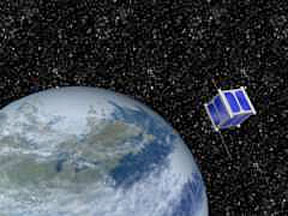 [SatNews] St. Thomas More Cathedral School (STM) in Arlington, Virginia, will kick off...
[SatNews] St. Thomas More Cathedral School (STM) in Arlington, Virginia, will kick off...
...its one-of-a-kind program to launch a student-built satellite into orbit. Dubbed “Mission Possible,” the program will use innovative educational methods, such as STEM-based (science, technology, engineering, and mathematic) curriculum to guide the students to assemble, build, test, and launch a CubeSat into orbit by 2014. The school’s goal is to be the first Pre-Kindergarten through Eighth grade elementary school program in the United States to accomplish such a program. ATK is a strong supporter of STM's Mission Possible and has provided funding for this project.
With the assistance of STM parent and NASA Mission Manager, Joe Pellegrino, STM students will help build a CubeSat satellite and then use the data the satellite collects for school research purposes in math and science. Currently, more than 60 universities and high schools are participating in the CubeSat program and the educational benefits are tremendous. STM is the first K-8 program to offer this exciting opportunity. Students, through hands-on work, will develop skills and experience used in the aerospace industry. The CubeSat program creates important educational opportunities for our future leaders.
The school's computer teacher, Melissa Pore, participated in the International Space University’s STEM satellite workshop, which focused on bringing real science and engineering projects to the classroom. Mrs. Pore networked with space scientists, engineers and astronauts who believe that STEM initiatives will inspire students to be tomorrow’s innovators.
An endeavor such as this requires a lot of support. STM received its first donation to assist STM in launching this satellite from ATK Space Systems. ATK Space Systems is a strong supporter of STEM initiatives in K-12 schools focusing on inspiring young people to careers in science and engineering.
STM has also developed relationships with professionals from the Goddard Space Center and a host of professors and engineers who have committed to help us in our quest for space knowledge.
If you would like to learn more about the project, donate resources or your time, please contact Melissa Pore at [email protected].
A November 2012 report by the National Research Council (NRC) highlighted the importance of laying the foundation for science, technology, engineering and mathematics (STEM) education in elementary school grades for K-12. A recent study by Georgetown University Center on Education and the Workforce shows that by 2018, 8 million jobs in the U.S. economy will require a college degree in STEM.

